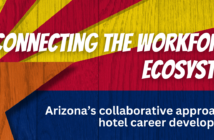By managing diversity in hotel properties, experts see momentous opportunity to boost creativity and problem-solving
by TOM GRESHAM
In the grand scope of history, the hotel industry has come a long way on diversity, equity, and inclusion issues, but not nearly far enough, said Greg DeShields, Executive Director of Tourism Diversity Matters.
“It was only 60 years ago when you wouldn’t have Black customers in a luxury high-end hotel,” DeShields said bluntly.
One key area where progress has been slow to arrive is diversity among the senior hotel-leadership ranks. Career advancement for women and people of color too often stalls, DeShields and other experts say. But the current moment could represent a crucial flashpoint that leads to important gains in this area, helping the industry emerge into a new era of leadership that better reflects the makeup of the industry’s workforce. And a diverse workforce is often a creative workforce because team members have unique viewpoints and backgrounds upon which to draw in solving day-to-day problems.
DeShields, a former manager in the hospitality industry who also serves as executive director of the PHLDiversity Multicultural Affairs Congress, said the Black Lives Matter movement and accompanying push to directly address systemic racism has led to a more effective conversation within the hotel industry about longstanding concerns. “We’ve certainly talked about diversity and inclusion, but it’s never been front and center in so many ways, especially as it relates to our industry,” DeShields said. Similarly, Peggy Berg, Founder and President of the Castell Project, said gender equality has taken a more prominent role in the conversation “as the country continues to reckon with issues of equality.”
While leaders of color have helped make diversity a greater focus in the industry in recent years, the momentum has slowed because of the COVID-19 pandemic’s unprecedented disruption of the global economy and the lodging industry, said Mike Gamble, Founder of Tourism Diversity Matters and President and CEO of SearchWide Global.
“There is opportunity,” Gamble said. “As the hotel industry begins to recover, a substantial focus to advance diversity evenly throughout the hotel industry, involving leadership roles, must be a priority.”
Berg agreed. She noted that reports across industries indicate that the pandemic is setting women and minorities back in their careers, but “the pandemic is such a massive reset that it could result in dramatic gains for diversity and inclusion if companies make those policy and management choices as the industry begins this unprecedented ‘regrowth’ period.”
“This is a turning point, one way or the other,” said Berg, a 30-year veteran of the hospitality industry. “Diverse companies will be aligned with their markets and customers and will thrive.”
THE LEADERSHIP PROBLEM
An unsuccessful track record for career growth and advancement for women and minorities lies at the heart of the industry’s issues. DeShields said you will hear people say, “Everyone has an equal opportunity to advance and grow in the hospitality industry,” but the truth isn’t so rosy.
“When you look at it through the lens of equity, you can see a lot of barriers and challenges around access,” DeShields said.
Berg said hotels have a majority-minority in line-level positions, both front and back of the house, but diversity diminishes as people attempt to advance in their careers.
“Particularly at higher levels in public-facing roles like director of sales and general manager and roles with [profit and loss]responsibility at the corporate level,” Berg said. “I believe there is an outdated and incorrect feeling that women and minorities will not be accepted in leadership roles by employees or clients. Each of us must get past this for ourselves and for our hotels.”
Lynette Montoya, CEO of the Latino Hotel Association, agreed.
“We see great diversity on the line level, where women often dominate in this area, then the diversity diminishes,” Montoya said. “The path to leadership is not proportional to the base of the staff.”
Gamble said the hotel industry so far lacks commitment and a deliberate strategy to leadership diversity. The industry simply hasn’t stressed the importance of inspiring and aiding entry-level workers to climb the ranks. DeShields said hotel leaders need to help entry-level employees envision paths to promotion and then show them how to take the steps that will propel them forward.
“It certainly hasn’t been emphasized and focused so far,” DeShields said.
TAKING ADVANTAGE OF OPPORTUNITIES
DeShields said the presence of a diverse workforce gives hotel owners inherent opportunity to bolster diversity in their leadership ranks.
“One of the things that is a strength of our industry is that it does represent such a wide-ranging display of diversity by the nature of our business and our staff,” DeShields said.
Not all industries can make that claim.
“A lot of industries will say that they’d love to be diverse, but they just can’t find enough representation in their industry,” DeShields said. “We don’t have to look far.”
In addition, Montoya said she sees genuine momentum toward improvement.
“I do believe there is a great desire from many industry leaders to see a shift in more diverse scenarios on all levels,” Montoya said. “On the other hand, it often remains a network that is difficult to join.”
Also among the industry’s strengths, Berg said, is that it has “remarkable goodwill toward women.”
“It’s taking a while for performance to match intention, but the industry has been moving toward women in leadership for a long time,” Berg said. “Interestingly, companies that took the lead, like Marriott, Hilton, RLJ, and HVMG, tend to be among the industry’s strongest performers.”
IMPORTANCE
The business value of diversity, equity, and inclusion touches not only on the workforce but the guest experience.
“Can you get the best customer service from employees who do not believe the company will treat them equitably?” Berg said. “Can you hire the best talent if potential employees do not believe your company offers them equitable career advancement? Will your remarkably diverse guests get the best service from employees who do not feel the company respects women or people of different races?”
DeShields said customers put pressure on hotels “to get it right.”
“There is an expectation of diverse customers to see diverse staff, not just folks who are opening the door and cleaning the room, but if I am booking an African-American fraternal organization … I should see people of color who are also negotiating the contract, who have significant leadership roles in the hotel to ensure customer service and to provide what is really an authentic experience,” DeShields said.
Diverse leaders also attract a diverse and talented workforce, and Gamble notes that younger workers are drawn to employers with a social conscience “who strive to make the world a better place.”
Montoya said a diverse leadership team pays off. “On the leadership side, diverse management enhances team engagement, growth, and advancement while creating loyalty and upward mobility,” Montoya said.
KEY STEPS FORWARD
Montoya said diversity, equity, and inclusion must be woven into the fabric of an organization, including in areas such as recruitment, retention, mentoring, training, leadership, and board representation. Adjustments “should be continuously institutionalized and measured to make a difference,” she said.
Gamble said hotels should emphasize accountability and defined communicated strategic priorities. Gamble said ethnically diverse apprenticeship programs, such as one that Tourism Diversity Matters offers, can play an integral role in career development efforts.
“Career planning and mentoring are critically important to retain top employees,” Gamble said.
And career planning and mentoring efforts can’t overlook those in roles that have been traditionally passed by, DeShields said. For example, DeShields noted, it’s laudable to celebrate the contributions of a housekeeper who has worked with a company for 20 years, but it’s important to evaluate if that worker ever had the help to seek out new challenges and possibilities for promotions, and to ensure future housekeepers have those opportunities. He said the industry must contend with questions such as “How does a housekeeper become a general manager, and is there a true commitment to see that person advance?”
Although there hasn’t been widespread progress yet, DeShields said individual hospitality and hotel brands have excelled at strategizing the growth and evolution of entry-level workers, offering promising signs of opportunities for improvement throughout the industry.
More diverse leadership also includes more diversity in ownership, but Montoya said minorities who are prospective owners currently face steep challenges to raise capital. In addition, Gamble said the lack of diversity on boards for hotel companies contributes to a lack of commitment and follow-through on diversity issues.
DeShields said departments within companies and companies within the industry can learn from each other, borrowing strategies and practices that prove effective in improving diverse representation in leadership roles. Ultimately, he said, the industry has an opportunity to make great strides, provided it maintains focus and commitment on the issue.
“We have all of the fundamental components that should drive us to make it a priority,” DeShields said. “It’s about holding ourselves accountable. This is something that we have to continuously and fundamentally improve and enhance. We have to continuously challenge ourselves to get it right.”




